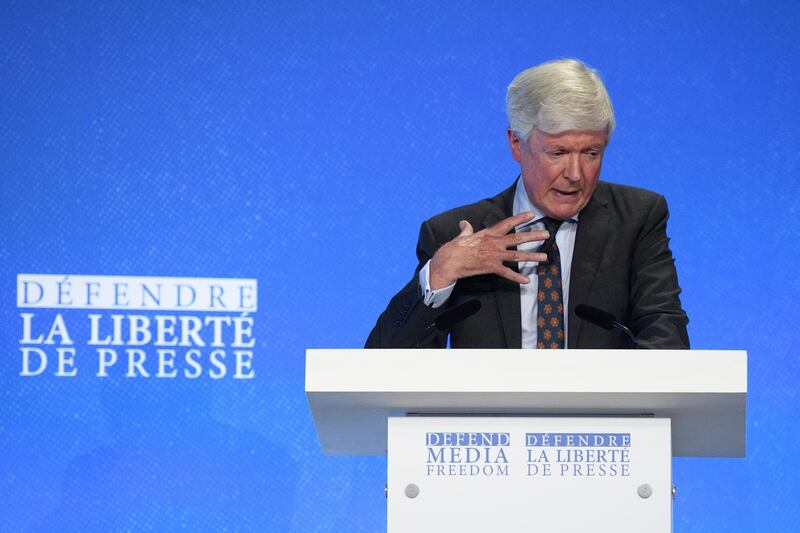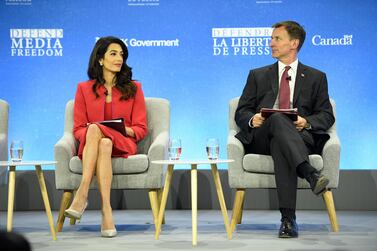The toll of deaths from misinformation and false news is rising around the world, according to policymakers gathered a London conference organised to promote media freedom.
Tony Hall, director general of the BBC, warned against the increasing threat of disinformation and fake news, which poses a significant threat to democracy and in some cases has led to people getting killed.
Speaking at the Global Conference for Media Freedom in London on Thursday, Mr Hall said: “Last year alone, the BBC identified around 25 lynch mobs deaths following rumours spread on social media or messaging apps. Many more were reported.”
“We’re now in the midst of the biggest assault on truth - and therefore democracy - since the 1930s,” he added.
“All those who believe in integrity in news must work together to turn the tide.”
Jeremy Hunt, the British foreign secretary and co-host of the conference, urged nations to sign up to an international pledge promoted by the UK and Canada. The two countries have also backed a Global Media Fund designed to operate under the auspices of the UN agency Unesco. “The UK with other governments are setting up an international task force to help young democracies develop their media freedom,” he told the meeting.
Even established democracies were proving vulnerable. In this year’s elections in India and Nigeria, Mr Hall said disinformation showed that it could “disrupt the debate”. BBC teams in India focused on calling out fake news stories spread deliberately for political gain during the elections in the spring.
“That won us audiences. But it also highlighted how frequently disinformation can now spark violence and even cause loss of life,” he said.
He added that bad actors and repressive regimes have not only weaponised misinformation, but some have “industrialised its production and packaged it for a global audience”.
He called on journalists to turn the tide and safeguard democracy.
Behind closed doors last year, the BBC hosted a Trusted News Summit where it brought together global tech giants and publishers to agree a set of actions to tackle the rise of misinformation.
Although he didn’t say any more on the conclusions they reached, the BBC chief said he would reveal more in the coming weeks.
“I’m determined that we use that unique reach and trusted voice to lead the way - to create a global alliance for integrity in news. We’re ready to do even more to help promote freedom and democracy worldwide. We want to play our part to the full at the heart of this critical campaign,” he said.
The Global Conference for Media Freedom, which is taking place on Wednesday and Thursday this week, hosted delegations from more than 100 countries, including 60 ministers, and at least 1,500 journalists, academics and campaigners.
Gobind Singh Deo, the Malaysian Minister of Communications and Multimedia who was on the panel with the BBC boss, said his government had promoted transparency.
“More media is restricted from carrying out its responsibility the more likely it will become a regime of authoritarianism and repression,” he said.
His government appealed the controversial anti-fake news act and although some politicians have called for its re-establishment, the government took a tough line to stop the law from being re-enacted.
“Social media can be easily abused and can cause damage to society at large,” he said. “When you have a law to prevent people from airing views and when we are afraid that the government may abuse it – which is what has happened in the past, we do not want any government – this or the next one – to abuse such a law.”
In another discussion on citizenship in a digital age on Thursday, there were calls for an offence of fake news should be punishable by criminal law. But the panel noted complications around such a move, as many people share fake news by accident and anti-fake news laws have been exploited by some governments.
The British Foreign Office’s Special Envoy on Media Freedom, Amal Clooney, announced at the conference on Thursday the members of a panel of legal experts that is designed to shine a light on media abuses and reverse a trend of violence against journalists.
The panel, which convened for the first time at the conference, is chaired by Lord Neuberger, former President of the UK Supreme Court. On the panel will include Mrs Clooney, Irwin Cotler, the former Canadian Attorney General; Nadim Houry, executive director Arab Reform Initiative; Hina Jilani, advocate of the Supreme Court of Pakistan, as well as other human rights, political and legal officials.







